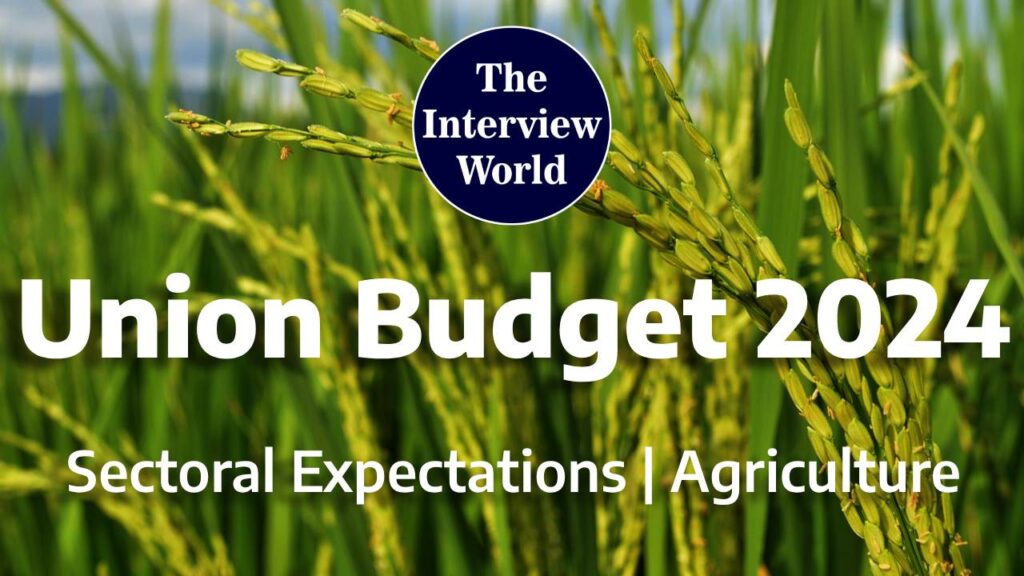Siraj Hussain, an Advisor at FICCI and former Secretary in both the Ministry of Agriculture & Farmers Welfare and the Ministry of Food Processing Industries for the Government of India, brings a wealth of experience to the table. With an extensive bureaucratic career spanning approximately four decades, Siraj has made substantial contributions to governance across diverse ministries. Notably, he serves as a trustee for the World Food Programme Trust in India and is a regular contributor on agriculture and food policy topics to esteemed publications.
In an exclusive interaction with The Interview World, Siraj Hussain shares insights into the expectations surrounding the agriculture sector from the Union Budget 2024. Here, we present key highlights from his interview.
Q: What do you anticipate for the agriculture sector from the interim budget?
A: Anticipation is running high for the upcoming Union Budget on February 1, 2024, despite it being just an interim budget. This is due to the historical context where, in 2019, the Indian Government introduced the Pradhan Mantri Kisan Samman Yojana during an interim budget. Presently, this scheme holds the record for the highest allocation under the Department of Agriculture and Farmers Welfare.
Our wish list for this year’s budget is clear – we hope to see a comprehensive five- or 10-year roadmap outlined specifically for the agriculture and rural sectors. Looking back, the 2019 interim budget presented a unique scenario. While interim budgets, especially those on the eve of Lok Sabha elections, are typically subdued, the 2019 interim budget set a remarkable precedent.
During that period, the government not only introduced a much-needed direct income support scheme, PM Kisan Samman Nidhi, but also made it applicable from December 2018. This unconventional move ensured that the first installment of PM-Kisan reached a substantial number of landholders before the 2019 elections. The 2019 interim budget thus serves as a benchmark, making the presentation of the 2024 interim budget particularly important given the upcoming Lok Sabha elections in April-May 2024.
Q: What key priorities do you believe the upcoming Union Budget should address to enhance and support the agricultural sector?
A: Firstly, it is crucial to devise a strategy that not only provides a roadmap for better-paying employment opportunities but also enables agricultural workers to transition into better-paying employment, thereby enhancing their income.
Moving on to the second priority within the agricultural sector, the focus should be on averting the degradation of soil and water resources in India’s original green revolution regions – Punjab, Haryana, Western Uttar Pradesh, and Uttarakhand. The ecological challenges in these areas are well-documented, acknowledged not only by the government but also by the farmers themselves.
As for the third priority outlined in the budget, it is imperative to allocate resources to support the allied sectors like horticulture, livestock, and fisheries. . This is particularly essential due to the shifting dietary preferences towards more nutritious and protein-rich foods. Addressing the urgent need to combat widespread malnutrition among the impoverished population can be accomplished by encouraging higher protein consumption. Notably, around seventy percent of India’s population is non-vegetarian, and meat serves as a cost-effective source of protein for them.
Q: Climate change poses a significant threat to agriculture. How do you envision the budget incorporating strategies to build climate-resilient farming practices and mitigate the impact of climate change on the agriculture sector?
A: I wish that the budget specifically addresses the pressing issue of climate change and its adverse effects on agriculture and the rural economy. Notably, the high temperatures experienced in February 2022, erratic rainfall during the monsoons of 2022 and 2023, and untimely rains in March 2023 have significantly impacted the production of essential crops such as wheat, rice, sugarcane, pulses, and others.
This adverse climatic pattern forced the government to take measures, including restricting or outright banning the export of wheat, rice, and sugar. To fortify Indian agriculture against the challenges posed by climate change, there is a critical need for substantial investments in research. This investment would facilitate the development of climate-resistant seed varieties, a crucial step in mitigating the impact of unpredictable weather patterns on crop yield. In this endeavor, indigenous varieties could play a pivotal role and should be a focus of attention. This Government has done well to recognise the importance of preserving indigenous varieties of various crops.
The budget must acknowledge the long-term threat that climate change poses to food security, even if this concern may not be an immediate focal point in the election cycle. Proactive steps must be taken now to safeguard the future of our agricultural sector and, consequently, our food security.
Q: How do you anticipate the government addressing agricultural challenges through upcoming budgetary measures, and what specific reforms are you hoping to see in the agricultural sector?
A: The policies and budget allocations must align with the potential of the rural economy to enhance the productivity of various items. To achieve this, both the government and private sector must make substantial investments in the marketing infrastructure for these products. This is also necessary if agricultural exports are to be boosted. Over the past decade, the government has made commendable decisions to bolster the agriculture and allied sectors.
However, the repeal of three farm laws was perceived as a setback to agricultural marketing reforms. It is crucial to regain momentum for reforms, taking into account the diverse ground realities in various states. The BJP-ruled states can show that the reforms will be matched with higher investments, both by the Government and the private sector.




Hi, I think your site might be having browser compatibility issues. When I look at your website in Safari, it looks fine but when opening in Internet Explorer, it has some overlapping. I just wanted to give you a quick heads up! Other then that, fantastic blog!